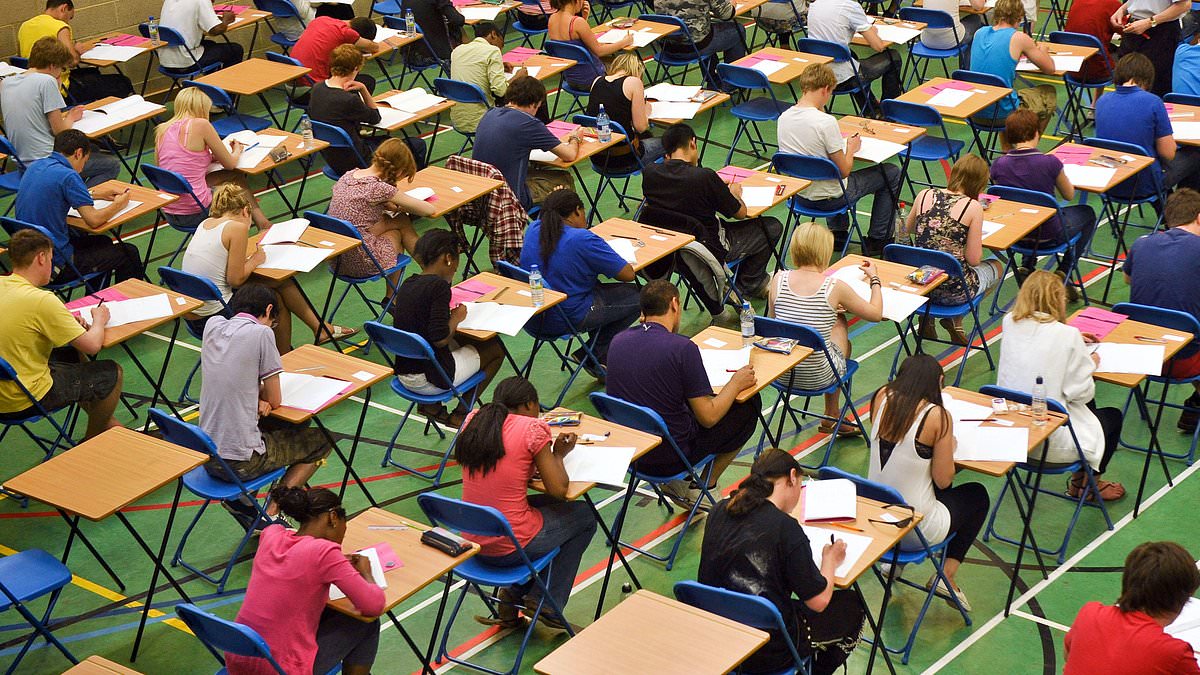Woke exam chiefs have removed ‘problematic’ words such as ‘immigration’ and ‘homosexuality’ from papers – and advised history teachers to avoid the term ‘medieval’.
Exam boards across the UK have stripped out what they consider to be ‘outdated terminology’ and ‘decolonising’ syllabuses to make them more inclusive.
One of England’s biggest boards, Edexcel, has branded a series of words, including ‘immigration’, ‘slave’, ‘native Indian’ and ‘gypsy’, as ‘problematic’.
Its sanitised GCSE history syllabus – which covers early Elizabethan England, the USA and Nazi Germany among other topics – replaces ‘slaves’ with ‘enslaved people’ and ‘native Indians with ‘indigenous people’.
Meanwhile, mention of ‘gypsies’ has become ‘Roma and Sinti’ and ‘Jews’ has been altered to ‘Jewish people’.
It also replaces ‘immigration/immigrant’ with ‘migration/migrant’, even though they are generally understood to mean two different things, with the former applied to permanent settlement and the latter denoting a temporary resident.
Examiners have also erased references to tensions caused by immigration to the UK.
In a section entitled ‘Whitechapel, c1870–c1900: crime, policing and the city’, the old version directed pupils to study: ‘The tensions arising from the settlement of immigrants from Ireland and Eastern Europe. Pressures caused by the increase in Jewish immigration during the 1880s and the tendency towards segregation,’
In the new course, which will be examined for the first time next year, teenagers will look at: ‘The impact of changing patterns of migration: the settlement of migrants from Ireland and Eastern Europe, and the increase in Jewish migration during the 1880s.’
Another exam board has criticised as ‘Eurocentric’ the division of history into ‘medieval, early modern and modern eras’. In its new draft GCSE history syllabus, Welsh board WJEC tells teachers that in light of the ‘welcomed debates regarding the decolonisation of history’ they may ‘wish to avoid using these terms’.
The push to phase out ‘medieval, early modern and modern’ follows the crusade to ‘decolonise’ the term Anglo-Saxon, which Woke academics say is associated with ‘whiteness’.
Meanwhile, the word ‘homosexuality’ has now been deemed inappropriate. It has been removed from Edexcel religious studies GCSE and replaced with ‘same-sex sexual relationship’ to ‘use more inclusive, up-to-date terminology which is better suited to the context in which it is used’.
The Cambridge University exam board OCR, like its competitor Edexcel, has reviewed how it refers to the early inhabitants of North America.
It has taken out the term ‘Plains Indians’ and added ‘Native Americans of the Plains’ in its GCSE history syllabus, to avoid ‘outdated terminology’. Students using the old term will still be credited.
Critics have accused the awarding bodies of attempting to censor language, stifle debate and denigrate Western civilisation.
Chris McGovern, chairman of the Campaign for Real Education, said: ‘These changes represent a declaration of educational warfare against British and Western identity. It is akin to China’s Cultural Revolution under Chairman Mao. Public examinations are being weaponised to force children to conform to the tyranny of Woke ideology. It is an outrageous abuse of the power that exam boards have over young people.’
A spokesman for Edexcel, which is owned by Pearson, said: ‘Pearson is committed to ensuring content is clear and accurate for teachers and students. We regularly update content in our specifications and involve teachers and other external experts where relevant in this process.’
Jeremy Black, British historian and former professor of history at Exeter University, said: ‘It would be welcome if exam boards would focus on maintaining and improving teaching standards rather than addressing passing fads some of which are problematic, to be polite. This reworking of the presentation of the past unfortunately appears in some cases to be based on politicised approaches and an aspect of what can fairly be termed culture wars.’
A spokesman for WJEC said: ‘As part of the new specification, schools will offer different routes of study, with a minimum of 50% of the new course now being focused on Welsh and British History. In line with other specifications we are also offering options in European and World History: these include optional areas such as the Songhai Empire, where the classification of medieval, early modern and modern periods is less appropriate.
‘To ensure that learners have clarity of the timeframes regardless of the region(s) they study in the European and World History options, we will provide dates to indicate the timeframes that we are referring to.
‘Whilst some commentators object to attempts to decolonise history, other commentators, of course, do not, and these are the debates that provide the fuel for rich historical discussions.’
